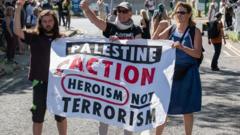Can Palestine Action Overturn the UK Ban? Court Says Yes!

Legal Challenge Against the Proscription of Palestine Action: An Overview
The legal landscape surrounding protest movements often becomes a battleground for fundamental rights and state power. Recently, Palestine Action, a group known for its direct actions against firms linked to Israel's military, has garnered significant attention after winning a bid to challenge the UK government's decision to classify it as a terrorist organization. This monumental legal challenge, spearheaded by co-founder Huda Ammori, raises crucial questions about the nature of activism, the limits of governmental power, and the implications for civil liberties in the UK. As Palestine Action navigates the complexities of legal scrutiny, the implications of this case extend far beyond the group's immediate concerns, touching on broader issues of freedom of expression and the right to protest.
The Context of the Proscription
The UK government's decision to ban Palestine Action is rooted in a specific interpretation of terrorism legislation. The laws in question focus on organizations that utilize serious violence to promote a cause. However, the UK has broadened this definition to include groups responsible for serious criminal damage, making Palestine Action the first group to be banned under this particular provision. With this new classification, any membership or support for Palestine Action has become a criminal offense, punishable by up to 14 years in prison. This drastic measure has profound implications not only for the group but also for individuals who may wish to express solidarity with its cause.
Palestine Action's Direct Actions
Since its inception in July 2020, Palestine Action has executed over 385 direct actions targeting companies associated with Israel's military, leading to more than 676 arrests. These actions often involve significant property damage, which the government cites as justification for the ban. Notably, the most contentious incidents include a break-in at Elbit Systems in Bristol, where allegations of violence against security personnel and police were raised. The legal ramifications of these actions are now central to the arguments being presented in court, as Palestine Action's members maintain that their activities fall within the bounds of legitimate protest.
The Legal Proceedings
In a pivotal moment for Palestine Action, Huda Ammori's legal team has sought permission from the High Court to challenge the Home Secretary’s decision. The lawyers argue that the proscription places legitimate protesters at risk of criminalization for merely expressing dissent regarding the ongoing situation in Gaza. They contend that the UK's stance on Palestine Action has rendered the country an outlier on the international stage, raising concerns about the government's commitment to upholding the rights of activists.
The Government's Justifications
Government officials deliberated for over eight months before deciding to classify Palestine Action as a terrorist organization. Internal documents reveal a complex debate involving police chiefs, who expressed concerns that existing laws were insufficient to manage the group's activities. They argued that banning Palestine Action would prevent potential crimes, but also acknowledged that such a move might be perceived as state repression or an overreach of counter-terrorism measures. The implications of this decision highlight an ongoing tension between law enforcement objectives and the preservation of civil liberties.
International and Domestic Reactions
The classification of Palestine Action as a terrorist organization has sparked considerable debate both domestically and internationally. While some view the ban as a necessary step to maintain order, others argue it represents an attempt to stifle political expression. Documents from the Foreign Commonwealth and Development Office (FCDO) suggest that international partners may interpret the ban as a stance against antisemitism, yet they caution that it could be perceived as an overreaction by the UK government. Such perspectives underscore the potential diplomatic ramifications of the UK’s decision.
Implications for Civil Liberties and Activism
The proscription of Palestine Action raises critical questions regarding the rights of activists in the UK. Many civil rights advocates argue that the ban sets a dangerous precedent, potentially criminalizing legitimate forms of protest and dissent. The implications extend beyond Palestine Action, as other activist groups may find themselves similarly targeted under the expanded definition of terrorism. This situation necessitates a careful examination of how governments balance security concerns with the fundamental rights of their citizens.
Potential Outcomes of the Legal Challenge
The outcome of Huda Ammori's legal challenge could have far-reaching implications for not only Palestine Action but also for the broader landscape of activism in the UK. If the court rules in favor of Palestine Action, it may signal a shift in how the government interprets its own terrorism legislation, potentially safeguarding the rights of protestors across the country. Conversely, if the ban is upheld, it may embolden further governmental encroachments on civil liberties, leading to a chilling effect on future activism.
The Importance of Public Discourse
As this legal battle unfolds, it is crucial for public discourse to remain robust and engaged. The implications of the case reach beyond legal parameters, touching on societal values regarding freedom of expression, dissent, and the role of activism in democratic societies. Engaging in informed discussions can help clarify the stakes involved and foster a deeper understanding of the nuanced issues surrounding state power and individual rights.
Frequently Asked Questions
What is Palestine Action?
Palestine Action is a direct-action group that focuses on protesting against companies linked to Israel's military operations. Founded in July 2020, the group has undertaken numerous actions that have led to significant arrests and legal scrutiny.
Why did the UK government ban Palestine Action?
The UK government classified Palestine Action as a terrorist organization based on its interpretation of terrorism legislation, which includes groups causing serious criminal damage. This decision stems from concerns about the group's direct actions and the potential for violence associated with their protests.
What are the potential consequences of the legal challenge?
The legal challenge brought by Huda Ammori could either uphold the ban, solidifying the government's stance on activism, or overturn it, potentially expanding the rights of protestors in the UK. The case's outcome may influence how terrorism legislation is interpreted in the future.
How has the public responded to the ban?
The public reaction to the ban has been mixed, with some supporting the government's decision to maintain order, while others argue it represents a suppression of political dissent. The implications of the ban continue to prompt discussions about civil liberties and activism.
What does this mean for activism in the UK?
The ban on Palestine Action raises significant concerns regarding the future of activism in the UK. If upheld, it may deter individuals from engaging in protests for fear of criminalization. It also sets a precedent for how the government may respond to other activist groups.
As the legal proceedings continue, the implications of this case serve as a reminder of the delicate balance between maintaining public order and protecting the rights of individuals to express their views. Will this legal challenge redefine the boundaries of activism in the UK? #PalestineAction #CivilRights #Activism
Published: 2025-07-30 13:28:04 | Category: technology



